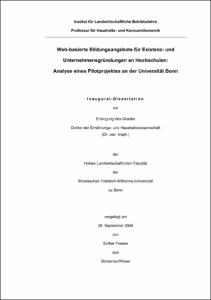Web-basierte Bildungsangebote für Existenz- und Unternehmensgründungen an HochschulenAnalyse eines Pilotprojektes an der Universität Bonn

Web-basierte Bildungsangebote für Existenz- und Unternehmensgründungen an Hochschulen
Analyse eines Pilotprojektes an der Universität Bonn

| dc.contributor.advisor | Piorkowsky, Michael-Burkhard | |
| dc.contributor.author | Freese, Esther | |
| dc.date.accessioned | 2020-04-07T15:20:35Z | |
| dc.date.available | 2020-04-07T15:20:35Z | |
| dc.date.issued | 2005 | |
| dc.identifier.uri | https://hdl.handle.net/20.500.11811/2171 | |
| dc.description.abstract | Neue Informations- und Kommunikationstechnologien in der Bildung sowie Gründungsförderung haben an deutschen Hochschulen in den vergangenen Jahren zu wichtigen Entwicklungen geführt. Sie können zu einer praxisorientierten Ausbildung an Hochschulen beitragen und neue Zielgruppen durch erweiterte Zugangsmöglichkeiten und ein größeres Angebotsspektrum erschließen. Diese Entwicklungen erfordern aber auch ein verändertes Verständnis von Lehren und Lernen an Hochschulen und führen zu neuen Hochschulstrukturen. Aus der Erprobung des Pilotprojektes Virtuelle Foren Unternehmensgründung und -entwicklung an der Universität Bonn werden Empfehlungen für die Planung und Durchführung sowie die Integration von Web-basierten Angeboten in der Gründungsbildung an Hochschulen abgeleitet. Die Auswertung des Pilotprojektes wurde mit Hilfe des Evaluationsmodells CIPP von Stufflebeam durchgeführt. Die Virtuellen Foren richteten sich an (potenzielle) Gründende aus der Hochschule und der Region und an Professionelle aus der Gründungsbranche. Sie sollten die Teilnehmenden u. a. in wichtigen Gründungsthemen weiterbilden. In jeweils sieben Wochen wurden im Sommersemester 2000 und im Wintersemester 2000/2001 Schwerpunktthemen von zwei Experten und einer Moderatorin in einem Web-basierten Diskussionsforum behandelt. Auch wenn die meisten Ziele mit dem Pilotprojekt erreicht wurden, so war insgesamt die aktive Beteiligung der Teilnehmenden an den Foren gering. Die Gründe sind vielschichtig, u. a. muss über eine andere Zusammensetzung der Gruppe sowie über neue Anreize nachgedacht werden. Auch müssen die Virtuellen Foren stärker in die bestehenden Strukturen der Hochschule integriert werden. Langfristig sind Web-basierte Bildungsangebote zu Gründungsthemen nur erfolgreich, wenn neue Lehr- und Lernformen akzeptiert und gefördert werden, eine entsprechende Unterstützungsstruktur zentral verfügbar ist, strategische Kooperationen innerhalb und außerhalb der Hochschule eingegangen werden, die Finanzierung auch zum Teil aus dem Haushalt der Hochschule erfolgt, Anreize für alle Hochschulangehörigen geschaffen werden, die technische Infrastruktur auf die Bedürfnisse abgestimmt ist und ein Projektmanagement etabliert sowie die Entwicklungen durch Evaluation und Forschung begleitet werden. | en |
| dc.description.abstract | Web-based training in entrepreneurship at higher education institutions - a pilot project at the University of Bonn The introduction of new information and communication technologies and entrepreneurship education have led to changes in the organisational structure of higher education in the last few years. These areas not only support a more practically-oriented style of education, they may also increase the range of students enrolled at universities as a result of more flexible access to education and more course choices. However, the introduction of new technologies and entrepreneurship education also provides a different perspective on teaching and learning which may lead to changes in the university structure. The pilot project Virtual Forums in Entrepreneurship at the University of Bonn was designed to provide recommendations for use in the planning and implementation of web-based entrepreneurship education and its integration into present structures of higher education. Data was gathered and evaluated using the CIPP method developed by Stufflebeam. The target group of the Virtual Forums was (potential) entrepreneurs from the Bonn region, particularly from the universities, as well as professionals in the entrepreneurship business. The purpose of these forums was, among other things, to educate participants in issues of entrepreneurship. Two different topics were offered by experts for seven weeks each, in the summer term 2000 and the winter term 2000/2001. Evaluation of the pilot project shows that most of the goals have been met. However, the expected participation rate was not achieved. The reasons for the low participation rate are complex, and there may have to be changes to the composition of the target group and to the incentives offered in order to increase activity. Furthermore, better integration of the project into the structure of the university is necessary. Web-based entrepreneurship education can only be successful when new ways of teaching and learning are widely accepted and promoted, a supportive structure is provided through central service units, strategic co-operations are entered into both internally and externally, financial resources are partly covered by the university budget, incentives are created for all constituents, the technical infrastructure meets the needs of the new developments, and appropriate systems of project management, evaluation and research are in place. | en |
| dc.language.iso | deu | |
| dc.rights | In Copyright | |
| dc.rights.uri | http://rightsstatements.org/vocab/InC/1.0/ | |
| dc.subject | E-Learning | |
| dc.subject | Fernstudium | |
| dc.subject | Selbstständigkeit | |
| dc.subject | Evaluation | |
| dc.subject | Hochschulorganisation | |
| dc.subject | distance-learning | |
| dc.subject | entrepreneurship | |
| dc.subject | self-employment | |
| dc.subject.ddc | 330 Wirtschaft | |
| dc.subject.ddc | 370 Erziehung, Schul- und Bildungswesen | |
| dc.subject.ddc | 640 Hauswirtschaft und Familienleben | |
| dc.title | Web-basierte Bildungsangebote für Existenz- und Unternehmensgründungen an Hochschulen | |
| dc.title.alternative | Analyse eines Pilotprojektes an der Universität Bonn | |
| dc.type | Dissertation oder Habilitation | |
| dc.publisher.name | Universitäts- und Landesbibliothek Bonn | |
| dc.publisher.location | Bonn | |
| dc.rights.accessRights | openAccess | |
| dc.identifier.urn | https://nbn-resolving.org/urn:nbn:de:hbz:5N-04700 | |
| ulbbn.pubtype | Erstveröffentlichung | |
| ulbbnediss.affiliation.name | Rheinische Friedrich-Wilhelms-Universität Bonn | |
| ulbbnediss.affiliation.location | Bonn | |
| ulbbnediss.thesis.level | Dissertation | |
| ulbbnediss.dissID | 470 | |
| ulbbnediss.date.accepted | 12.11.2004 | |
| ulbbnediss.institute | Landwirtschaftliche Fakultät : Institut für Lebensmittel- und Ressourcenökonomik (ILR) | |
| ulbbnediss.fakultaet | Landwirtschaftliche Fakultät | |
| dc.contributor.coReferee | Kutsch, Thomas |
Files in this item
This item appears in the following Collection(s)
-
E-Dissertationen (1033)




